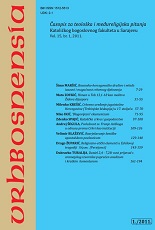Religiozno-etički elementi u Eshilovoj tragediji Perzijanci
RELIGIOUS SENTIMENT AND ETHICAL ELEMENTS IN AESCHYLUS’ TRAGEDY THE PERSIANS
Author(s): Drago ŽuparićSubject(s): Literary Texts
Published by: Katolički bogoslovni fakultet
Keywords: pride; destiny; justice; demon; devil; the Avenging Deity; joke; envy of gods
Summary/Abstract: In this article the author writes about religious-ethical emphases in the tragedy “The Persians” by the Greek poet Aeschylus, whom literary scholars consider the father of tragedy. Growing up during the era of the struggle for democracy and actively fighting in the Greek-Persian wars, Aeschylus, who was of aristocratic origin, was a poet of exalted sentiment: he celebrated Greek virtues. All of Aeschylus’ plays, in addition to “The Persians”, try to preserve faith and the sacred in the pantheon by offering an authentic explanation of tradition. The article deals in particular with those sections in the tragedy that directly or indirectly mention deity, doom , human conduct that undervalues deity and human laws; and those types of conduct that could be termed as sin, violence, pride, etc. The article offers interpretative analysis of textual specimens and explains theories and insights related to particular examples.
Journal: Vrhbosnensia
- Issue Year: 2011
- Issue No: 1
- Page Range: 143-160
- Page Count: 18
- Language: Croatian

